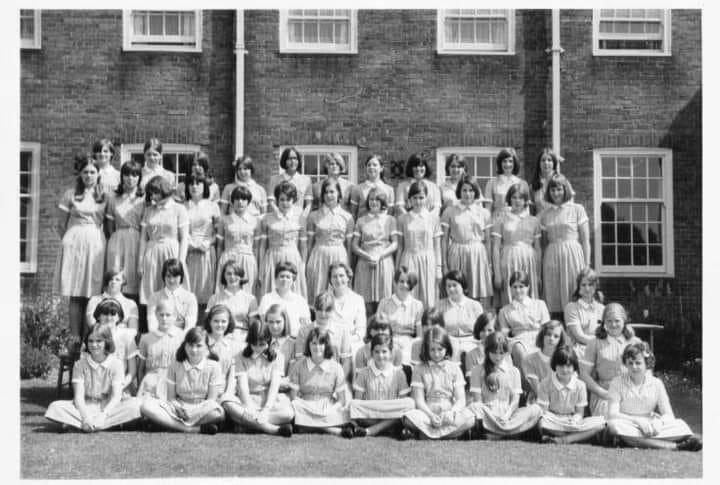Memories of my SchooldaysRMS in the 1960s



This book was produced in 2023 by RMS for Girls.
With thanks to all our ‘Old Girls’ who have who have shared their stories and memories for others to enjoy.
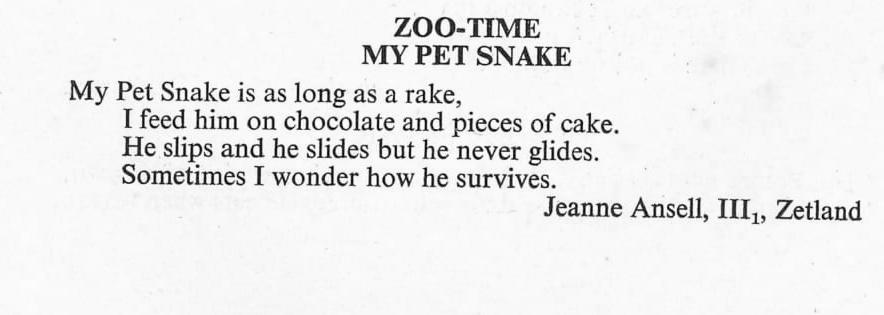
Foreword
Vivian Wright, 1963, Atholl
Judith Podmore (Aspinall), 1963, Atholl
Sandra Davies, 1963, Zetland
Deborah Palmer, 1964, Connaught
Caroline Kentish (Farrell), 1964, Connaught
Margaret Jonquil Brooks (Holman), 1964, Connaught
Anne Clark (Margaret Speight),1964, Cumberland
Eve Clements (Barber), 1964, Cumberland, Eileen Pointer (Richer), 1964, Sussex
Heather Utley (Gay), 1965, Alex
Linda Bostock (Campbell), 1965, Cumberland
Marion Cranston (Nikki Nickson), 1965, Atholl
Karen Buddery, 1966, Atholl
Jane Lee (Shirt), 1966, Alex
Christine Filmore (Absolon), 1966, Moira
Helen Wilberforce (Eileen Aspinall), 1967, Atholl
Mary Chandler-Allen (Chandler), 1967, Moira
Joy Eve (Ellis), 1968, Moira Maureen McVie (Gorey), 1968, Alex Sally Goodman (Stevens), 1969, Ruspini Hilary (Billie) Moore (Cowell), 1969, Atholl Margaret Johnson (Brookeman) and Heather Williams (Terry), 1969, Connaught Rosemary Rath (Hoes), 1970, Atholl Michele Edmonds, 1970, Alex Barbara Jackson (Briscoe), 1970, Zetland
Kate Kirk, (Catherine Jarvis) ,1971, Connaught Sylvia Newell (Riley), 1971, Moira
Alison Boorman (Cox), 1971, Alex Kate Raphael (Greaves), 1971, Sussex
Sheena Simpson (Smith), 1972, Zetland Amanda Painting (Searle), 1972, Zetland Liz Mauritz-Tozer (Tozer), 1972, Moira Hilary Guile, 1972, Alex
The Memories of my Schooldays series of life at The Royal Masonic School for Girls moves into the 1960s. It would appear that the cliché of that decade as a time of youth and a release from the conventions of earlier decades applied even at Rickmansworth – well, to a degree! You will read of repeated references to radios permanently tuned to Radio Luxembourg, and of ‘illegal books’ being passed around. It is not quite comparable to an age of social media, but not wholly disconnected either. Young adults will always seek access to a world that the grown-ups would like to forbid or censor, it seems.
This collection of memories is also notable for repeated references to wonderful teachers and housemistresses who had a significant influence on the lives of their students. We hear of creativity encouraged by Miss Funnell and English with Jill Hopkins, and again I am minded of their successors nowadays changing lives of RMS girls forevermore.
The sense of difference and continuity is summed up well by Eve Barber who joined school in 1964 and now as Eve Clements writes, “Our school life was obviously very different from school life today and yet we all share so much. A good education in a beautiful setting in buildings that have adapted so well to the ever-changing demands of education, and of course the opportunity to be part of the traditional School Drill.”
School Drill and The Royal Masonic School are both truly unique. I know you will enjoy reading of the special and precious first hand memories of ‘My time at Ricky’ as much as I have done myself.
Kevin Carson HeadteacherSo many things spring to mind when thinking about my time at Rickmansworth but many of my recollections are intertwined with the influence of my remarkable Housemistress, Lilian Funnell. She has had a significant influence on my life, and I owe her a great debt.
As well as being my Housemistress in Atholl House, she also taught me art – a subject for which I had no talent at all. My reports ranged from a euphemistic ‘good’ to a more realistic ‘fairly good’ and even a slightly more expansive ‘Vivian has imagination and with more control over her media could do good work’. Nevertheless, she instilled in us a love of art, especially through the ‘Art App’ lessons in the Sixth Form. In these she talked to us about the great Italian Renaissance artists but she was also open to modern art. I remember her spirited defence of ‘The Snail’ by Matisse, which was bought by the Tate Gallery around that time and attracted a lot of controversy.
She also took her Sixth Form group to visit the newly rebuilt Coventry Cathedral and ran a lively Art Society, which had Christmas parties and sometimes a quiz. In 1962 she brought a guest speaker, Ivor Beddoes, who gave a very lively and entertaining talk about designing the set and costumes for the epic film Cleopatra.
Miss Funnell too, turned her hand to set and costume design in 1959 for the production of The Mikado, performed in honour of Miss Fryer’s retirement. That was a memorable evening! Miss Funnell also encouraged our creativity in extra-curricular ways, such as the making of the Christmas Post Box.
Over and above all this, I owe her a tremendous debt of gratitude for her kindness to me. When my twin nephew and niece were born, I had bought a baby card, but it only had one baby. So Miss Funnell painted another baby on to the card! I think she understood the difficulties of my home situation and she never lost an opportunity to promote my interests, making me a prefect and giving me the responsibility of dusting her room each morning.
I’m afraid I was an ungrateful recipient of these favours, but I do remember sobbing in her room on one occasion over some unkind remark and she told me that in life we have to develop the hide of a rhinoceros! I am not sure that I have been very successful in following this good advice, but I have frequently passed it on to others.
We kept in touch after I left school, and I would visit her in the little cottage where she had retired to. Whenever I phoned, she would always say, ‘I was just thinking about you.’ Well, now so many years later, I often think of you, Miss Funnell, and I would like to say a big thank you.
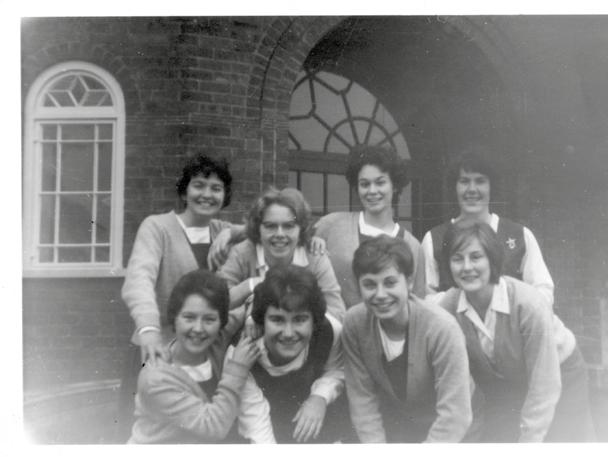
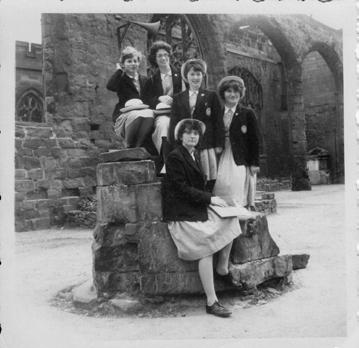
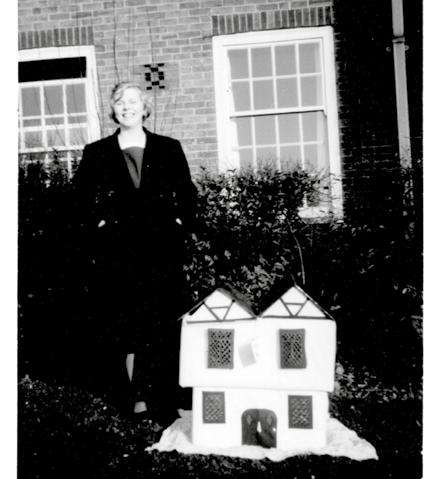
I arrived at Atholl House after spending two years at Weybridge. During my first term we experienced a flu epidemic. So many of us were ill that they opened up ‘flu dormitories’ in the houses. I can remember feeling small and vulnerable. I was so sick that I ended up in the San. Someone told me there was an operating room there and that made me feel very scared.
That winter there was ice on the pond. A group of us had the great idea to skate on this ice and I thought what a wonderful opportunity it would be to get to the little island in the middle. Of course, knowing nothing about currents, I forged ahead until, unsurprisingly, the ice broke and I fell in the water up to my neck! I can remember the gardeners coming with a ladder to fish me out. I ended up in the San once again, this time with a dreadful cold. Miss Fryer, the Headmistress, apparently announced my stupidity to the whole school and put the pond out of bounds until it thawed.
I can also remember enjoying an illegal book, Gone with the Wind, which began circulating around Cumberland House. When it finally arrived in Atholl, we took turns reading it. Of course, there really was nothing illicit in the book, but it wasn’t written by Jane Austen and was a romance novel, and so was not approved of.
My friend, Susan Lee, was to become Head Girl in her last year, and I was leaving a year early to do a Foundation Year at Manchester College of Art and Design. One night, at the end of my final term, a group of us decided to have a midnight feast. We somehow managed to gather up a decent amount of food and about halfway through our party we were discovered by Flip (the name we had for Miss Funnell). She broke up the party and was really angry with Sue. We were afraid this would jeopardise the Head Girl position for her, but fortunately that didn’t happen.
I feel that although my experiences at school were not particularly warm, my education was excellent. I was well prepared for life, further education and roles of leadership, along with great happiness. How fortunate I have been!
I went to Weybridge in 1954 after my father passed away when I was six, and spent the rest of my education there and at Rickmansworth.
On the day I went by train to start school at Weybridge, I met Anita Broan and Elaine Whomes, who I still keep in touch with to this day. Friendships were a very big part of life at school.
My whole school life has very happy memories, despite missing my mother. The recent passing of HM Queen Elizabeth II has taken me back to when she came to Rickmansworth to visit. Being at Weybridge, all the pupils were taken up for the visit.

I was at Weybridge Junior School from age seven in 1955 and went up to Ricky in 1959 aged eleven. School was strict, almost Victorian in some aspects, and also slightly eccentric.

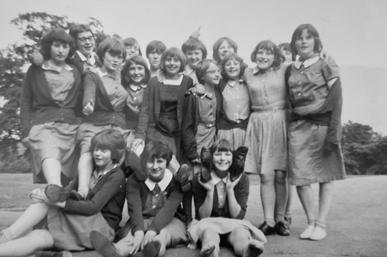
Talking after lights out was strictly forbidden, but of course we all did. If caught by Matron, you were presumed not to be tired and would have to go down to the linen room to darn thick lisle stockings (which were part of our winter uniform, held up with old, pink satin, pre-war suspender belts) using a wooden mushroom.
Alternatively, we had to learn a passage from the Bible. This had to be repeated back word perfect before being allowed back to our beds, which had been stripped to the mattress and had to be remade in the dark.
On Sundays, after morning Chapel, we were allowed our only trip out of the School gates, in a lengthy two-by-two crocodile around the local village, led by a teacher at the helm. We were buttoned up in double-breasted coats and felt panamas in the winter, or wool blazers and straw panamas in the summer. How we hated to be seen out in our old-fashioned school uniforms by any of the local boys!
Any parcels from home had to be opened in front of the House Matron to check for contraband. One enterprising mother, aware of this rule, sent her daughter a new pair of slippers in a shoebox with a false bottom, underneath which were laid flat bars of chocolate. We delighted in cheating the system.
All our books were inspected to ensure suitability. One girl covered her illicit copy of Gone with the Wind with brown paper, under the more acceptable title The Holy Bible!
On weekend mornings, we were allowed two biscuits each at elevenses, with a glass of milk. These were kept in a large tin and shut away in a cupboard in the downstairs linen room, the door of which was always locked when Matron was not present. There was also an upstairs linen room directly above, which was left open; a dumb waiter lift connected the two.
On the umpire’s chair, 1962. Top to bottom: Deborah Palmer, Caroline Farrell, Daphne Carpenter, Louise Young, Dorothy Cox, Penny McVitie

The Fisheries, 1962, in baggy ‘school drawers’

Feeling rather hungry one Saturday afternoon, a group of older girls devised a plan to raid this tin. Being small for my age, I was selected to climb inside the constricted space and sit bunched up among the folded sheets. The idea was to lower me down to the locked room beneath to raid the tin. Unfortunately, someone ‘keeping cavy’ down the end of the upper corridor signalled the approach of the assistant housekeeper. I spent the next half-hour or so trapped inside the tiny cupboard until she eventually left, by which time I was too scared to go back in and complete the raid!
One snowy day, my friend Caroline Farrell and I were desperate to go sledging, so we borrowed the large metal tray from the scullery and took off at great speed down the long snowy path towards the pond and the kitchen garden. It was great fun until we hurtled into a tree at the bottom. My brave friend broke her arm holding it out in front of my head in an effort to protect me. She was patched up at the Sanatorium and returned with it in a sling.
We had our house wireless in the common room permanently tuned to ‘Radio Luxembourg’ in the evenings. We had the raw end of one of the wires stuck in the side of the radiator below, in order to produce a louder sound – not sure how that worked but it did!
I was awarded a red posture girdle which I proudly wore along with my sister Stephanie. I loved all the military style marching and the exercises, but remember us all being nervous waiting in the corridors to march in on Committee nights, and especially performing in front of Princess Alexandra. As I was small I always had to stand right at the front so was directly facing her, worried I would do the wrong exercise out of line with those behind me.
I think we relied on each other quite a lot on all levels, emotionally and otherwise; we buoyed each other up, mucked in and made the best of it.
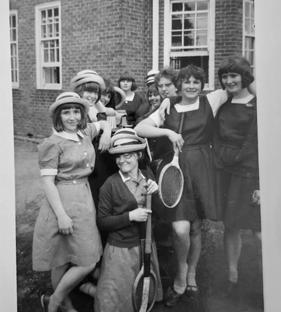
I can remember no heating in our bathrooms except for the hot water pipes running around the edge of the room. Washbags were supposed to be kept on the high window sill and, in the depth of winter, they froze overnight to the window panes. The first person in the bathroom in the morning ran all the hot taps in an attempt to produce some warmth.
We were given a laxative pill covered in chocolate once a week whether we needed it or not. The House Matron stood in the bathroom as we all filed past having had one placed in our mouths. The first girl in line went straight into the dorm, opened the bottom sash window of the nearest window and we all followed by spitting the laxatives out of the window.

It was a dark, windy and wet evening in the Senior Common Room of Connaught House at the end of the October half term break. In the 1960s, girls did not go home for half term, so all were in the house after the evening meal on that Saturday night.
As a treat, Miss Sheila Cameron, our Housemistress, had promised to tell us all a ghost story. The juniors from dorms three and four were allowed to stay up late and come into the Senior Common Room for the story, provided they were in their pyjamas and ready for bed. Miss Cameron taught English and history and was well known for her story-time sessions, so the girls were eager to hear a ghost story that evening.
Lights were dimmed (by leaving most of them off) and the girls were soon swept up in rapt attention by the atmospheric tale she recounted. At a particularly scary moment in her story, a loud clanking, thumping noise outside the windows gave us all, including Miss Cameron, an almighty fright. Three seniors were immediately dispatched to go and investigate, whilst Miss Cameron tried to calm the mild hysterics of many little girls who were convinced the evil ghouls were just outside and the bogeymen were coming to get them.
Gripping each other tightly, two of the seniors went out of the side door to see what was happening. The third went upstairs to the dorm immediately above, where she found two naughty third formers leaning out of the window, each with the end of the very long ball and chain from a toilet cistern in their hands. These two mischievous rascals were thrashing the chains repeatedly against the windows below and had not heard her approach because they were giggling so much.
The two youngsters were marched downstairs to face the wrath of Miss Cameron, who subsequently gave them a serious telling-off and detention. However, it is fair to say the senior who found them could scarcely contain her mirth as she took them to Miss Cameron’s room and realised that she was having difficulty maintaining her fierce expression whilst handing out that detention.
The ingenuity of Royal Masonic girls in finding alternate uses for everyday objects must be acknowledged, I think.


I recall writing to my mother back home on Sunday afternoons. I really enjoyed this and it was an activity that I continued throughout my life whenever I lived away from home.
I really enjoyed reading and an hour was sometimes insufficient. The library was a great joy. Magazines, comics and chewing gum were banned. I am not fond of any of these to this day.
My mother came once a term from Yorkshire to take out my sister and me. On one of these exeats, we were taken to Windsor. I should have enjoyed the outing, but did not because I felt guilty that, unlike many of my friends, I was not swotting for my forthcoming O Levels.
As a senior, fire drills were practiced frequently. The drill was:
1. Put on your shoes and dressing gown, not slippers.
2. Draw back the curtains and close the window.
3. Go to your fire drill junior partner in the dormitory opposite.
4. Make sure that she had put on shoes, dressing gown, drawn back curtains and closed the window.
5. Take two blankets from her bed – one for yourself and one for her.
6. Put the blanket over your head and make sure the other blanket was over her head.
7. Guide her and yourself down the stairs.
8. Line up in number order on the grass opposite the house.
When fire drill was over, we went back upstairs and made up the partner’s bed (having left your own intact, thereby only one bed to make instead of two!).
My First Form English teacher was Ms Jill Hopkins. She certainly gave us a good grounding in English grammar.
In needlework, I learned to sew and enjoyed making my own clothes, even after leaving school. I still dabble in home furnishings. Geography with Miss Newnham was my favourite subject; I still love geography. Ms Strickland was a fierce teacher who taught us the very best English grammar and enthused us with literature. French was with Ms Vickeridge. Oh, how strict she was! I would never have passed O Level maths if not for Ms Cooper. Her favourite saying was, ‘Watch the board while I go through it.’
All in all, I owe a huge debt to these brilliant teachers who taught us from the heart, their lives enmeshed in educating us year upon year. I would not have achieved as much as I did without their constant support and encouragement.

I joined school at a time of great change. Miss Fryer had left in the July and Mrs Una Campbell became Headmistress in the September. She had a hard act to follow as she tried to make school more comfortable for the girls. The sixties were a time of great change in the world beyond school.
I well remember the Senior Common Room having a carpet and new curtains and even a television installed. In winter, we still chose to sit around the edge of the room hugging a radiator. It was a time of the Ashlar badge being introduced, with privileges including being able to wear home clothes on a Saturday night and going to the village in fours. Prep stopped being held in classrooms but was done in the house, overseen by the Housemistress, and when she went to supper, the prefects took over.
Miss ‘Kitty’ Jones was Housemistress of Cumberland. She was a bustling Welsh woman who meant well for the girls and ran a less harsh regime than some houses. She was a shy lady who hated rhubarb, taught geography and as Housemistress treated us well, within the strict environment of a boarding school in those years of change.
We were all bound by a common bond: we had lost a parent, which was usually a father; our fathers were all Freemasons; and our mothers had all made a personal sacrifice by accepting the Freemasons’ offer to educate their precious daughters, some as young as seven, at the Royal Masonic School.
We wrote to our mothers on Sundays after lunch and looked forward to receiving their letters. We did not have email, mobiles or access to the phone (although some girls would sneak out to use public phone boxes).
Our school life was house-based, sleeping in four dormitories with two common rooms and prefect studies for four girls in each house. Therefore friends were very important and became our family; we knew each other very well. We did not get on all the time and yet we were there for each other, to share the happy, sad or difficult times. Friendships made at this time have lasted for ever. School friends are honest, caring and loyal but not judgemental.
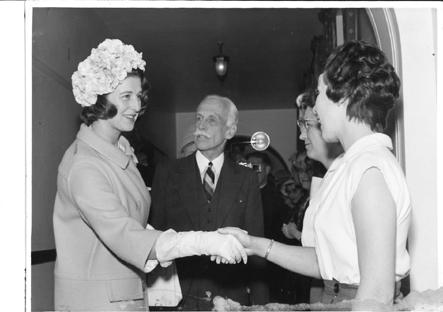
Our school life was obviously very different from school life today and yet we all share so much. A good education in a beautiful setting in buildings that have adapted so well to the ever-changing demands of education, and of course the opportunity to be part of the traditional School Drill.

I joined Sussex House in 1961 after my father’s death. My younger brother went to Bushey. I found it hard at first; I was homesick and not used to sleeping with 12 other people in a dormitory, or sharing a bathroom and washing in front of so many others. There were lots of rules, including only being allowed to have a bath on certain days or washing your hair once a week (until Matron caught me in bed with wet hair one night and we came to an arrangement whereby, if I would dry it in front of her gas fire, I could wash it when necessary).
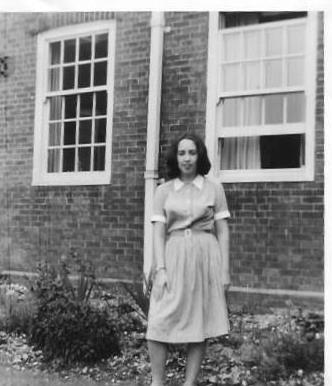

I loved the lessons, all the sports available and School Drill; dancing in the common room to the Beatles and the Stones; hot cocoa and iced finger buns for break in the winter; the time when we were snowed in for what seemed like weeks and when nearly all the School (except for me and a few others) went down with flu and lessons were abandoned; midnight feasts when someone had been sent a cake in the post; endless times on a Saturday morning spent darning lisle stockings; and the crocodile walks alongside the Grand Union Canal on a Sunday.
So many memories. My time at Ricky was short, only three years – my mother wanted me home after I had finished my GCEs to go to a local college. I learned valuable and lasting lessons which I took into my future life, and am
Eileen front left, 1964
My time at RMIG began in the January of 1960, a term later than the new school year, so friendships were already well established and cliques formed. I therefore found the entire situation difficult. My father had died the previous year so I felt for my mum, she had lost her husband, then ‘lost’ me and quickly had to find employment after being a housewife for 24 years.
She managed a visit to see me once a term and it was only in later years that I realised what an epic undertaking that was for her. On leaving work on the Friday night she would catch the overnight train (steam in those days!) from Darlington to London. The visit started at 11am so there would have been time to kill culminating in the walk up the hill to school. We usually went into The Brass Lantern in Watford for lunch and a wander around before returning to school a few short hours later. Her return overnight journey would have been equally long and arduous before work the following day.
I have no recollection of actually arriving at the School, or even saying goodbye to my mum, but I do remember going up to the dorm for the first time and seeing my uniform laid out on the bed. It included a bra which came as a complete surprise as I certainly had no need of one at that time!
Because I was a latecomer to the School, I was ripe for leg-pulling. As the end of my first term neared, the joy at the prospect of going home was overshadowed by the sheer terror of the ritual ‘crossing off’ of the painted plaques around the frieze in the dining hall. Tall ladders would apparently be brought in and each new girl had to climb up and cross off a picture each day in the countdown to the end of term. The final days dawned – along with the realisation that I had been the butt of a long-standing joke. Relief and humiliation were in equal measure.
We were always hungry and apart from the weekly visit to the tuck shop (where I believe everything was 6d a quarter), food brought or sent in was strictly forbidden. I don’t think it was the same rule in every house but it certainly was in Alex. My mum used to send me a weighty box each term that was required to be opened in front of Miss Newnham (otherwise known as ‘Goat’). She must have realised that the sheer weight of the box didn’t equate to the balls of knitting wool, notepaper and stamps that lay on top of chocolate bars, biscuits and assorted contraband, but thankfully never challenged me.
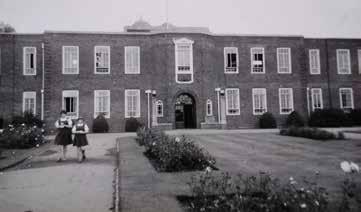
We developed a liking for under-ripe sweet chestnuts from the huge tree behind the tennis courts. On one occasion I felt the need of a tin of cling peaches. A friend was having visitors that weekend so I asked if they would please bring me a tin, which they duly did. The dilemma then was how to open the thing. The housecraft room at the far end of the school building was the obvious answer and, mission accomplished, is where I walked slap bang into ‘Goat’. She relieved me of the tin and handed out my one and only detention.

I have many memories of school life in Cumberland House from 1959 to 1965. Of course in those days things were a lot stricter!
Exeats consisted of one visit per term when my mother could come down from Liverpool. She would travel on the midnight train on the Friday, take me and my brother, who was at Bushey, out on the Saturday and/or Sunday, and travel home on the Sunday night to get back in time for work on the Monday.
This meant any school trips out were really special and memorable. Visits to Kew Gardens and Hampton Court Palace were two trips that I recall, but the best was a trip to Wimbledon in 1964. My dear friend Hilary (Bobbie) Barber and I were approached by an American couple who gave us their Centre Court tickets as they had to leave early. We were so excited and were even able to see Christine Truman playing. I remember ringing home, and my mother said later that she saw us on TV in our panama hats, because of course we were always in uniform on school outings!
I loved sport and managed to win the Victrix Ludorum in my last year. My only regret was that Princess Alexandra was visiting the school to present the prizes but unfortunately Sports Day was rained off and we showed her Drill instead. Miss Vaughan, the Headmistress from Weybridge, stepped in for the rescheduled Sports Day which took place on the uppers.
Cumberland House did well with sporting achievements, winning the Tennis Cup and Swimming Cup during the 1960s.
I have many memories of friends made at school. I feel very grateful for the education I received at RMS, thanks to the Freemasons, and went on to a very happy career in physiotherapy.
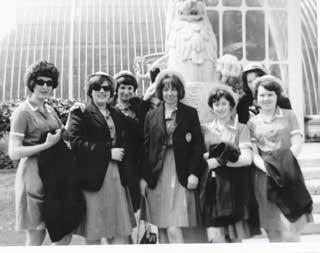


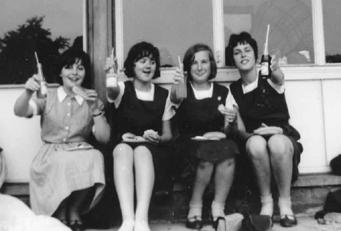
There were six girls in Atholl House in my year. We were all pretty good friends although temperaments and personalities were quite different.
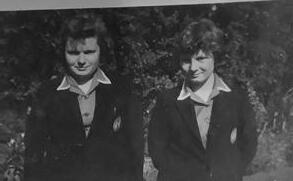
Miss Funnell was our Housemistress. My friends made the most of their time at school, studying well and generally toeing the line; I’m afraid I didn’t. Things didn’t improve as I progressed up through the years. My poor sister, older by two years, was the epitome of a well-behaved and all-round pleasant student. On one occasion, which happened to be a bank holiday in the outside world, many of us stood on the cloister wall, refusing to attend classes. My sister didn’t join the rabble. She was good, with a capital G, and she went on to do wonderful things for the people of the Congo (and other remote and dangerous regions of our world) as a medical missionary.

I remember a midnight feast, instigated by yours truly, when we pinched pickled onions from the dining room, bringing them back to the house in our summer hats. Imagine sitting behind us next time we wore our hats in Chapel! Some of us (I believe instigated by me again) went out of bounds to the Avenue, tempted by the ponies there. We were seen, of course, and our punishment was to sew handkerchief hems and to be left out of the filming of the School, being undertaken at that time by an American company.
We hoped for fame by writing notes and leaving them for future explorers in the roof space above the corridor, accessed from a cupboard in the junior library. We were caught then too, of course. We were pretty incompetent criminals.
In the First Form I was one of two girls chosen to potentially be point in School Drill. Unfortunately, the other girl won the spot. I did perform in the Trio though on other occasions, and the Duo and Duet, and always in Drill.
Reminiscent of the coronavirus pandemic, we experienced Asian flu. It must have been 1958. The virus swept through the School population, but I didn’t contract it until the epidemic was on the wane, and then I had it twice! When the majority of the School was laid low however, it was actually great fun for those of us who were not. Most of the dorms were used as sick bays, leaving only one per house for the untainted. We went for a walk every day, usually outside the School grounds. We barely had our customary timetables as there were not enough girls to fill any one class. The routine was quite different and of course we enjoyed the disruption to the usual lessons.
I did manage to win the Fourth Form prize and also the art prize at some stage. My lovely sister won the singing prize and the peculiarly named prize for Perseverance and Assiduity, which gave us a laugh. We interpreted it to mean – works very hard, applies herself admirably, but never quite makes it to the top!
I enjoyed sport and gym, playing tennis and netball, swimming, hockey and lacrosse, some of those activities boding well for my adult activities. I always loved art and have had some experience with illustration, in a small way. I was never brilliant at anything, but I loved the music offered and learned both cello and piano with Miss East. We were always lucky enough to host concert pianists who gave recitals as a prelude and practice for their proper concerts in London.



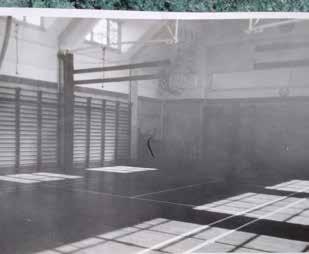
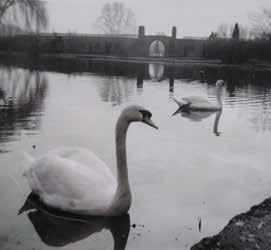
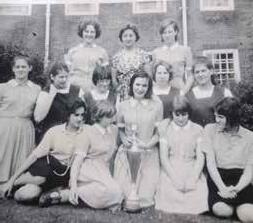
Our main contact with the outside world was through Radio Luxembourg. This was always on the radio in the common room while we played endless games of table tennis during our ‘free’ time. I’m still quite good at table tennis. I remember the stunned silence one day when the broadcast suddenly stopped, followed by the shocking announcement that President Kennedy had been assassinated.
We were always cold. I remember the pain of chilblains on my hands and feet. We hugged tepid radiators when we could get near enough but were forbidden to sit on them lest we got ‘piles’. In the hard, snowy winter of 1963, the grass on the Garth stayed white until the end of the spring term.

I was very upset in the summer of 1964 because none of my friends in Alex were staying on. As it turned, out these were probably my best two years at school, mainly because I buried myself in work. We had an inspirational teacher for A Level English. Her enthusiasm for literature and for theatre has stayed with me to this day. We studied Othello. During the holidays, I queued for a matinée ticket (ten shillings) to see Laurence Olivier play the Moor at the Old Vic. I was completely spellbound.
The Sixth Form was also my introduction to classical music, another lifelong interest. Some friends in another house had a record player. We played Ace of Clubs LPs with those iconic black and white photographs and brightly coloured title strips on the record sleeve.
My memories are not always happy ones, but I did start to develop some lifelong interests and, perhaps, a certain self-sufficiency which has helped me in my life. For those I am grateful.
I was nine years old, and my sister was seven, when we arrived at RMIG. Here are a few recollections of my schooldays:
Packing the suitcase for a new term. I loved getting new notelets and writing paper, ready to write home. Once a week we sat down to write our letters, which had to be vetted before posting, and my mum would write back every week. I looked forward to my name being called out to say that I’d got post when we would assemble back at our houses mid-morning.
The school day seemed to revolve around bells ringing for certain activities, such as getting up in the morning, having to kneel by our beds for prayers, then assembling in lines downstairs before heading off to breakfast. Every morning we had to line up for inspection.
I remember the Housemistress or Matron walking up and down the lines checking to see if we needed a haircut, and everyone stretching their necks to make their hair appear shorter!
Getting up early on a Sunday morning to attend Holy Communion and feeling faint during the service, as this took place before we had eaten breakfast.
I was short in stature. When I took part in the School Drill I was one of the front row of four facing each other by the stage before marching, and also in the front row for exercises. It was very nerve-wracking performing and not seeing what was going on behind.
When I was 16 years old there was a flu epidemic. The Sanatorium was full so a couple of the houses were commandeered for the extra patients. I remember nurses looking after us and having our temperatures taken regularly. We girls used to compare our readings.
In the winter months, we used to sit as close as we could to the radiators in the common room and spent hours reading. It was the only pastime I can remember us doing. We didn’t have the luxury of a TV until later on in my school years, when we were allowed to watch on Sunday afternoons. We never did see the end of a programme however, as the TV was trundled out of the room when it was time for us to go for our evening meal.
On Saturdays we were handed our clean laundry and had to sit down and do any running repairs. We had wooden mushrooms for reshaping the darns to our lisle stockings. Any stains on clothes were removed using a strong ammonia-smelling liquid and sponged off.

Just before leaving school, we were taken up to London to Dickens & Jones to choose some leaving clothes. I can remember getting a three-quarter-length camel coat, straight beige skirt and a bottle-green twinset. Back at school, we were given a choice of shoes, together with underwear.

I followed my two older sisters to Weybridge in 1958, when I was seven. We were allowed to take one teddy bear, and had few other possessions of our own.
The playground was notable for its unusual tree – a ginkgo biloba which we believed was the only one outside of Kew Gardens. We would roller skate here and sometimes see stag beetles, while the maintenance men (the only men we ever saw) were summoned to remove them.
The dining room seemed to be the heart of the School. It was full of large tables and benches. We had allocated seats in size order. I was small so I never progressed very far. It was a lovely oak-panelled room with the original staircase off one end, close to the front door and the office from whence came our post. There was a hatch through to the kitchen and it was close to this that the Matron on duty would stand and receive almost instant silence at the beginning and end of the meal. There was a large old fireplace at one end and, above this, an oil painting which incorporated a working clock that some of us found fascinating.
I believe that all children everywhere think that theirs was a typical childhood. We certainly thought it was quite normal not to have a father, because that was the case for the majority. We were always well fed and clothed and probably quite good at following routines. We bathed once a week and very occasionally had our hair washed. This we dried before an open fire in the dorm, especially lit for the purpose. At the beginning of each term we queued up for ‘scurf combing’, the School’s attempt to control nits.
At Christmas, the hall would be out of use for a day while it was decorated for Christmas. When we were allowed in, it was simply magical!
Entertainers, including George Cansdale (famous as an animal man on TV), visited on a few occasions. We sometimes watched films on Saturday evenings.
I look back on Weybridge as a happy, sometimes idyllic, childhood.
So came the ‘promotion’ to Rickmansworth in September 1961. This meant that all three Aspinall sisters were at the same school for the first time. We all had a good education, had a certain sort of independence, and learned to be resilient, but we had limited freedom to make our own decisions.

Ashlar status was awarded to the well behaved. Privileges included the ability to walk down to Rickmansworth town on a Saturday afternoon and to wear one’s own clothes on Saturday evenings.
We sang Grace at the beginning and end of each meal. There was a ‘tradition’ that at the end of the autumn term each new girl would be expected to go up a ladder to the pictures at the top of the (high) wall in the dining hall and ‘cross them off’ with chalk. Of course they did no such thing, but it was fun to string new pupils along with the preposterous idea.
Assembly was morning and evening. The assembly hall was also, of course, the venue for School Drill – a unique and impressive marching and exercise ritual that predated PE and gymnastics.
Girls with good posture could achieve a posture girdle – an impressive purple sash worn around the waist.
I went to Weybridge in 1957 aged eight. As an only child I was excited at the prospect of having lots of new friends and don’t recall feeling upset. On the day we arrived at school, when the time came for our parents to leave us in the common room, a lot of the other children were crying; I was happily waving goodbye and it was my mother who was in tears! In due course I moved up to Rickmansworth and was assigned to Moira House, together with my two best friends from Weybridge.
Whilst boarding school is not for everyone, it suited me. I’m afraid I was rather naughty until I got to the Fifth Form when I began to realise that being good brought privileges. Our Housemistress for the first couple of years was Miss East, who was very fierce, and nobody dared misbehave in front of her; I think even my mother found her quite intimidating. She was followed by Miss Thompson.
Particular memories include: Getting our weekly allowance of sweets from the tuck shop; fainting in early-morning Communion; ballroom dancing lessons with Miss Wainwright; the visit of Princess Alexandra; Committee nights, when we did square dancing with some of the Committee members in the Main Hall; going on the coach to away hockey matches at nearby schools, which was a welcome chance to see the outside world; being proud of getting a posture girdle (which I’ve still got, together with my school blazer!); Sixth Form dances at Bushey – much anticipated but something of an anti-climax, heavily policed by the staff; getting up in the early hours to revise for exams, usually sitting in the bath wrapped in a blanket; driving lessons in the Upper Sixth with a local driving school, two girls in the car (I don’t think the driving lessons lasted long – probably only a couple of years – so we were very lucky to be the ones who benefitted); occasionally being allowed to watch television, which was wheeled into the common room for us to see a particular programme. I recall we managed to watch the Beatles on the TV, which was the highlight of the term.
As time went by the rules were relaxed and we had a bit more freedom. Sixth formers were allowed to wear their own clothes on a Saturday and later to make trips to Rickmansworth village unsupervised. I do not recall ever having the chance to telephone my mother during term time, but we had to write a letter home every week. I believe that we all acquired a certain skill in composing letters because of it. I remember receiving my Ashlar badge and subsequently I became a prefect with a study. This was a great bonus; we plastered the walls with pages from fashion magazines and pictures of our favourite groups.
When it came to leaving, I remember going up to Arding & Hobbs to get our leaving clothes. It was specified that we must purchase certain items, such as a day dress, a jacket or a suit, a coat or raincoat. We had such fun trying on these clothes, which ultimately had to be approved by the member of staff who accompanied us.
I left school in 1967. RMS was good for me and I’m grateful for an excellent education. My school friends remain my oldest and dearest friends.
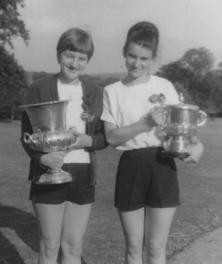
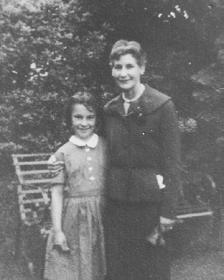
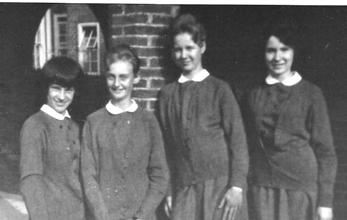
I lost my Father in 1960 and I arrived at Rickmansworth in September 1961, about two weeks before my 11th birthday. I travelled down by train from Newcastle-upon-Tyne with my mother. It was comforting to find that in those days almost everyone had lost either one or both parents to gain a place at school; I think this was an early lesson in realising that there is always someone worse off than yourself.
I enjoyed my seven years in Moira and made some wonderful lifelong friends from all walks of life.
I was a lively, talkative and mischievous little girl. I was often in trouble for talking when I shouldn’t and leaving my belongings in places where they shouldn’t be!
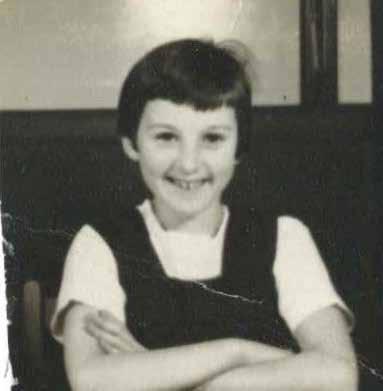
I am often reminded of the night when I kept on talking after lights out, despite being warned several times by Miss Thompson, our Housemistress. She eventually wheeled my bed out into the dark corridor where I stayed all night, listening to the sixth formers go to their dorms and the house maids up to their quarters. It was a very frightening and sobering experience, and needless to say it didn’t happen again. It still causes amusement.
I remember doing somersaults over the bed curtain rails, usually after lights out.
Thankfully I settled down and did achieve my Ashlar badge.
I loved sports and played hockey and lacrosse for the house and the School. I was heavily involved in athletics especially, sprinting, long jump and hurdles and Moira House won many sports cups. I enjoyed competing at Watford stadium in the County Sports.
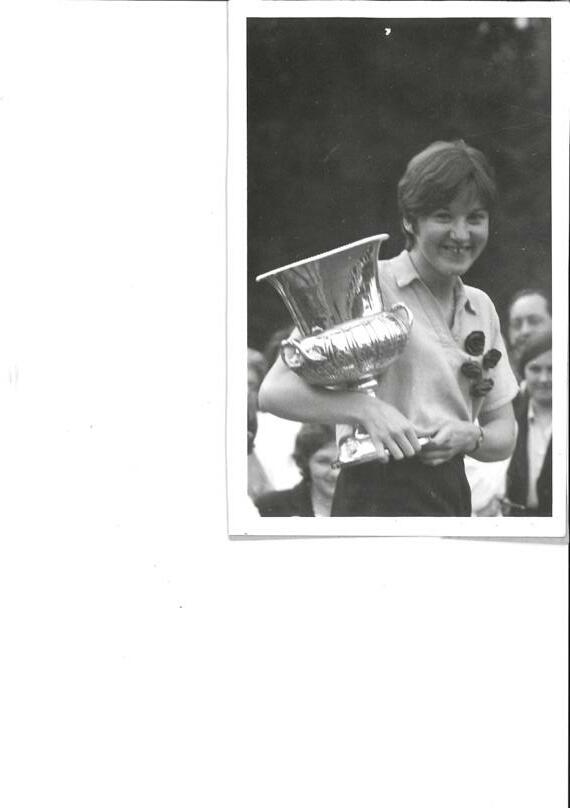

I am grateful for the unique opportunity I was given to attend RMS. It gave me a good education and grounding for my future career spending over thirty years teaching and working with young people in Further Education.
The most important aspect of my schooldays are the valuable friendships I made and the ability now, 60 years later, to meet up with these friends to laugh, cry and remember our time together at RMS in the Swinging Sixties.
My father died in November 1964 and my name was put forward for a place at the Royal Masonic School. Before I left, I remember looking at an aerial photo of the School in the brochure and marvelling at the vast expanse of the grounds in a beautiful country location.
I felt awful leaving home because my mother worked long hours in London and therefore I looked after my young brother and the house.
The conditions at school were very good. We had a nice, homely house to live in and I worked as hard as I could. I had been bullied at a previous school, but at RMS it was such a close community, that bullying was rare.
I enjoyed attending religious instruction, geography, history and English classes. I can remember my English teacher talking to me before I went into the hall to sit my English O Level and telling me that I would pass it if I wrote shorter sentences. I duly did what she had told me, and so managed to pass the exam. I was glad of this advice.
I also enjoyed playing lacrosse on the beautiful playing fields. I was a goal keeper in the 2nd XII lacrosse team.
My mother worked hard all week and often couldn’t visit me on exeat days because she was probably too tired at weekends to make the journey. I could understand her absence because she was busy keeping the home fires burning.
When I first joined the School, two senior girls from my house took me to the Chapel as some sort of initiation ceremony. I noticed them flicking the lights at the back and when I looked down the nave into the shadows, I could see the shape of a bishop with his hands up praying. The lights were flicked on again and on the left-hand side of the corner of the ceiling I could see what looked like a hunchback in the shadows. The rest of the Chapel must have been in darkness in order to see all this happening.
Whenever I buy Pears soap, I am reminded of how I used to have it at school. I also used to love the smell of the walls in the main building when I first returned back to school after the holidays. They would smell of wood polish.

Looking back, I realise that the School made me the person I am today. It encouraged independence and looking after oneself. Although I had suffered a loss when my father passed away, I was lucky to be able to complete my childhood in such a beautiful setting. The School helped me see that although I had suffered a major bereavement, I had good things to look forward to in the future. It was a wonderful experience being a pupil in the School. I was very fond of the teachers and made some good friends there as well.

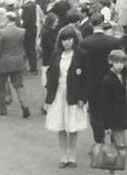
I have various memories of my time at Rickmansworth and I seem to have been in trouble quite often during the first couple of years. For example, the time my year group marched out of Assembly backwards and we lost a visit; talking after lights out and spending many hours on a hard, wooden chair facing the wall downstairs with others; taking apples from the orchard resulting in writing a hundred lines; and punishments when caught having a midnight feast.
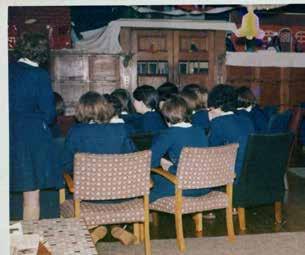
Sports Day was a big summer event, where we competed in houses. If you were lucky enough to win a prize, they were always lovely and useful items, such as rackets or tennis balls. The sports fields were huge and we were offered lots of different sporting opportunities. I enjoyed taking part in netball, hockey and lacrosse teams, as well as being in the District Sports hurdles and relay races one year. These events also offered the rare opportunity to travel outside of the School.

We would all sit crowded around a small TV, which we only watched on weekend evenings. At Christmas, we would decorate the common room and I particularly remember the ‘glockenspiel’ on the table which was lit every evening. Mrs Rudd, the Housemistress, had lived in Germany and this traditional Christmas decoration had been brought over from there.
It must have been a relatively new thing to be able to wear our own clothes, as I don’t remember this being something we did very often during my time. In the summer term of the year we left school, we were taken to Selfridges in Oxford Street and kitted out. We had a kit list to choose from, but not all of it was in stock on the day, so it was quite exciting but also disappointing if they didn’t have what you wanted in your size.
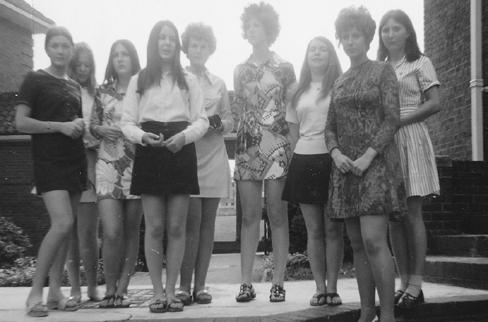
My main memories are about going to Weybridge in 1965, when I was eight.
My dad died in 1964, a couple of months before my seventh birthday. All of a sudden, life was turned upside down, and I went from being in a family consisting of a mum, dad, brother and three sisters, to being all on my own in a great big house with lots of strangers. I lost my whole family.
I made some lifelong friends and memories. I learned self-resilience.
The most precious memories are those of the enduring friendships made and evolved over the years at school and beyond, including those of us whose RMS lives began at Weybridge. It’s hard to imagine that, out of what was a deeply emotional experience, such a precious jewel of friendship continues to thrive today; or maybe it’s because of it.
It has been a beautiful deepening of friendships over the years despite the challenges of going to boarding school during our formative years, some of us from as young as seven years old.
Highlights from our years at school mainly consist of events that are a bit left of centre, and so some secrets will need to remain between ‘us girls’.
Notable events like: midnight swimming in the pool; long summer days revising or lounging in the long grass near the lower playing fields; larking around near the kitchen gardens (out of bounds) by the pond and swinging on the branches of the willow trees; smoking Gauloise, Russian Sobranie and Dunhill cigarettes in the bathroom with towels stashed under the doors. Yes, we were unashamedly pretentious! We were part of the dawning of ‘The Age of Aquarius’. We wore black mascara and eye make-up, short skirts and were going to make our way in the world!
However, being taught Chaucer by the inimitable Ms Strickland was a privilege; learning Latin with the wonderful Mr Collingwood, the School vicar, was the closest we got to interacting with a male role model (I know he’d be turning in his grave at that – but with a smile on his face!). Also: playing in trios simultaneously on multiple pianos at school events; being small enough to be ‘point’ in School Drill; late-night visits to the Chapel where one of us was talented enough to have learned to play the organ; this, whilst we arranged the lights to depict shadows and shapes over the altar (a practice passed down over the years); learning how to muffle laughter in Chapel in morning and evensong with a mouthful of handkerchief, the cause of the laughter never really apparent.
Mags Brookeman and Heather Terry. [sitting in Garth with backdrop of the bui the new Library]
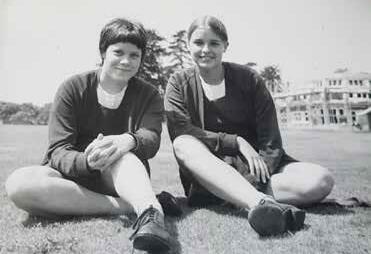
Mags Brookeman, Lynne Beattie, Judy Bennet-Rees, Heather Terry. [ Somewhere out of Bounds]
Margaret Brookeman, Lynne Beattie, Judy Bennet-Rees, Heather Terry

Lastly, a ‘shout out’ to our Housemistress, Miss Cameron, who was sadly the brunt of many jokes and imitations, but whose grace and love of literature and drama was legendary. She was much underestimated at the time. She cast me as Toad in a production of Toad of Toad Hall that led me to take a two-year drama course alongside my A Levels.
We all left at different times and in various circumstances. I never attained a posture girdle, an Ashlar badge or was there long enough to become a prefect. I did, however, manage to pass my O Levels and then subsequently my A Levels at college.
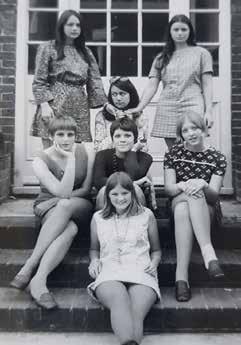
I feel blessed to still have many dear Connaught friends in my life, all of whom continue to enrich my life now. So thank you RMS, for being the conduit for such joy and happiness in later life, and thank you to all the other girls and women who I met at school in the Swinging Sixties – you are all woven into my life, making me the richer for it.
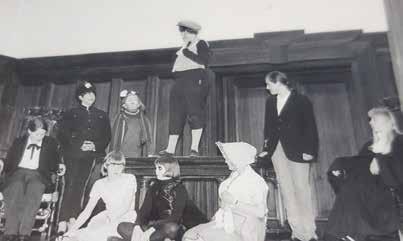
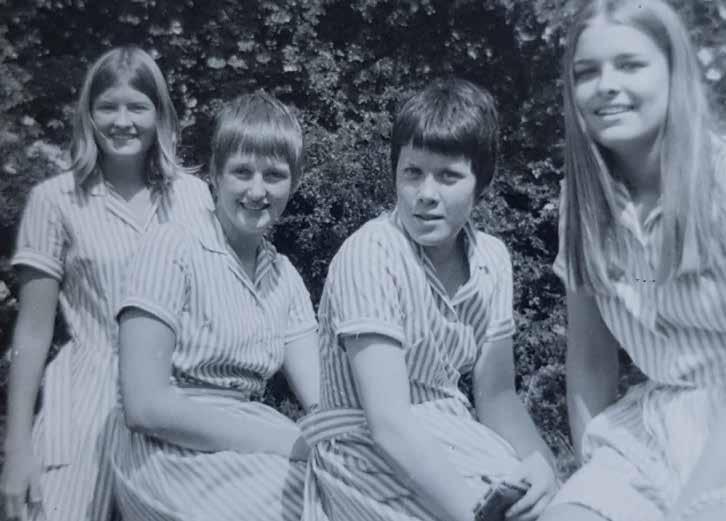 Judy Bennet-Rees, Lynne Beattie, Margaret Brookeman, Heather Terry
Judy Bennet-Rees, Lynne Beattie, Margaret Brookeman, Heather Terry
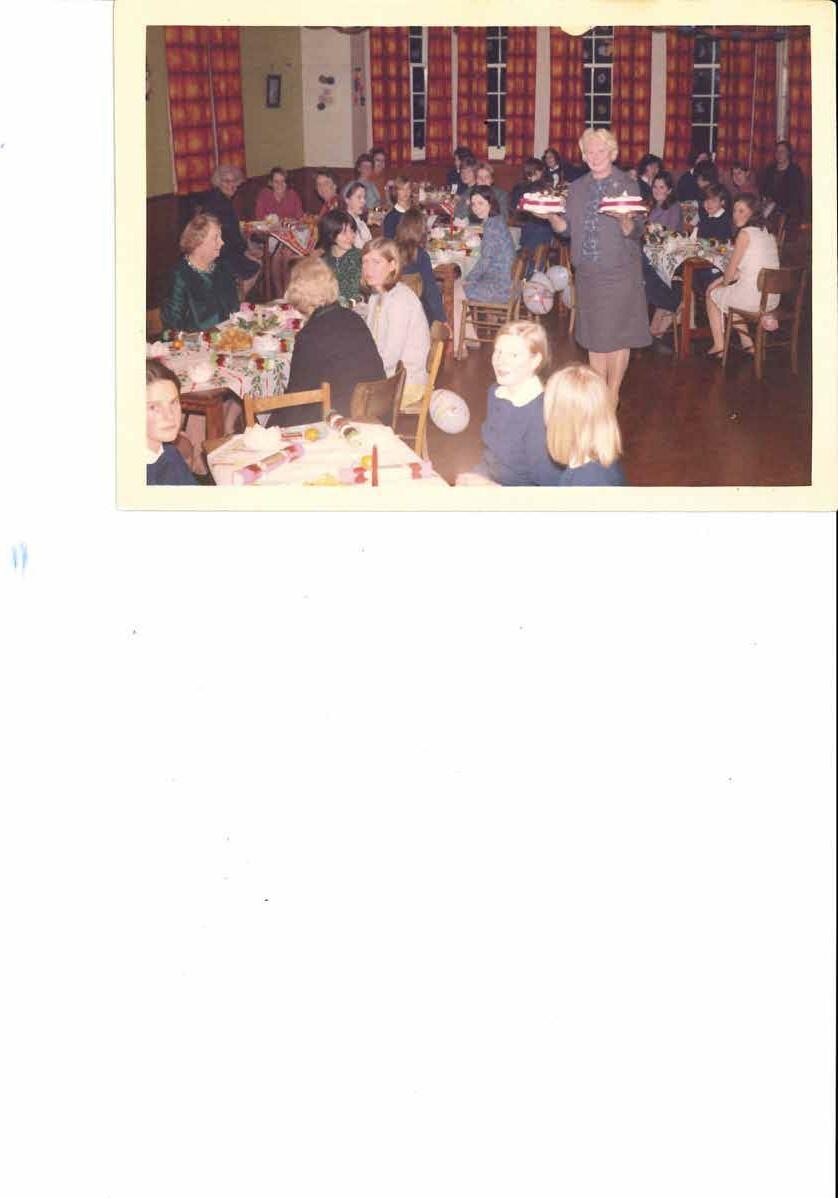
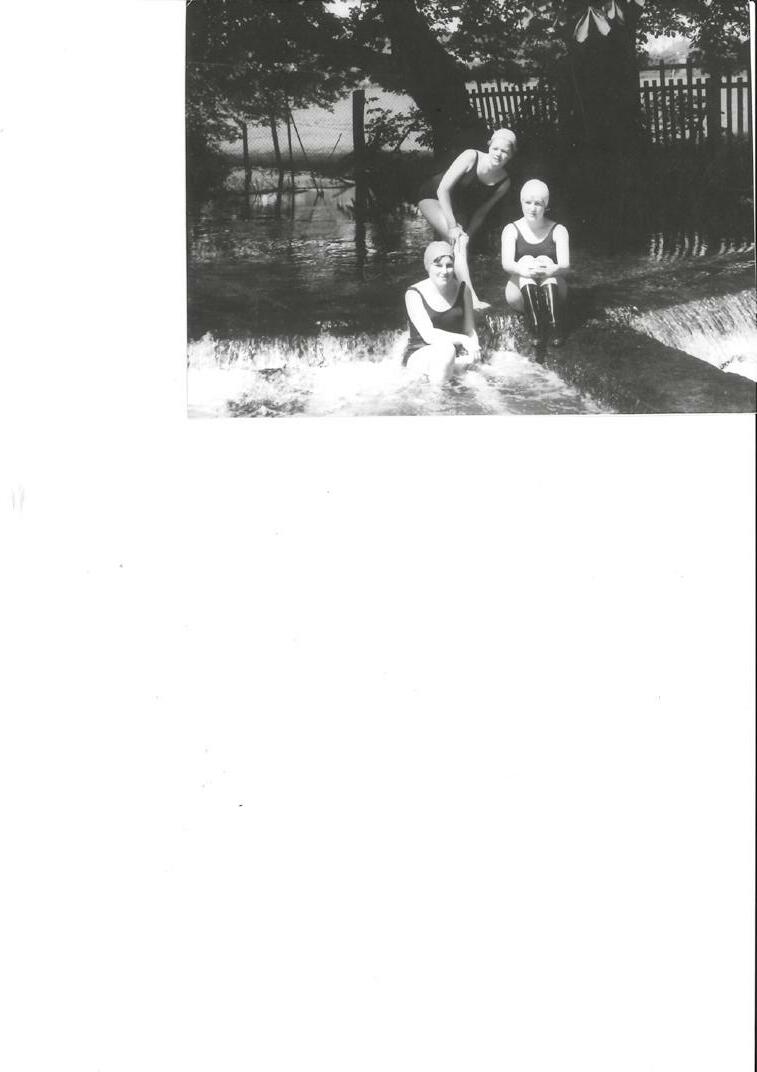
One very vivid memory of my time in Atholl was the making of the Christmas card post boxes. These we designed, cut out, glued together, painted and put up in every house towards the end of the autumn term. During the Christmas parties in the houses, the boxes were emptied and the cards that had been posted were distributed to the individual girls or pairs. I remember one year we made a model of Atholl House.
I really enjoyed all the musical and drama productions and inter-house competitions, including The Life of Galileo and Noye’s Fludde. Our choir, along with other school choirs, performed Royal Albert Hall. We were all dressed as nuns.
I have too many happy memories to mention here, but one very unpleasant memory prevails: having to sew dress preservers, or change used ones, into our serge winter uniforms, which were very unpopular. On Committee nights we were given clean white collars to button into our dresses. We much preferred the summer uniforms.

Like most of the girls at school, my father had died when I was very young. He was a Freemason and so I attended an interview with Miss Vaughan, the Weybridge Headmistress, and was offered a place at RMIG. Having read the Malory Towers books, I was very excited to start boarding school and enjoy those midnight feasts and pillow fights; little did I know it would not quite reflect those Enid Blyton adventures.
The first day at Weybridge, I waved goodbye to my mum and excitedly rushed off to get my uniform and learn about this new school. Unfortunately, that first night away from home proved very hard, being in a different bed and in a dorm with strangers. There was no goodnight hug from my mum, and only my teddy bear for comfort.
After a while, I settled into school life and in fact, that year won the class book prize, Wind in the Willows, which sits on my bookshelf today.
My main interest was sport and I was proud to represent the School at the annual District Sports and at the Weybridge District Brownie Sports, helping the School to win the Brownie Sports Championship that year, 1963.
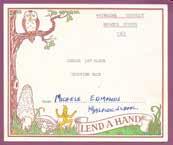
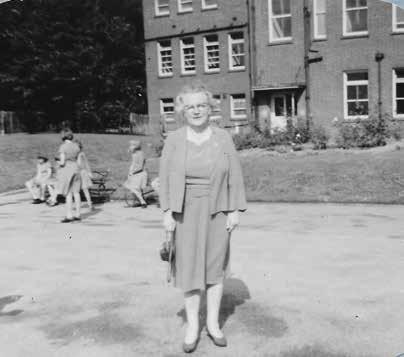
Although it was hard being away from home during that first year, I do have some happy memories playing with friends, especially roller skating, hopscotch, jacks, skipping and two balls against the wall, games that are rarely seen in playgrounds these days.
Other recollections from Weybridge were communal baths, drying our hair in front of an open fire (no hairdryers), watching films in half term, walking into Weybridge for Sunday church, a cod liver oil capsule to be taken every morning at breakfast, ‘sugar bags’ (summer undies), the ginkgo tree, pixie hoods, hot milk before bed, and of course the once a term ‘exeat day’ when mum would visit and take me out for a few hours. Brownie skipping certificate
After three years at Weybridge, we moved to the senior school at Rickmansworth.
As new girls, we were each introduced to a House Mother from the Sixth Form who would help us settle into our new life; mine was Tina Bray.


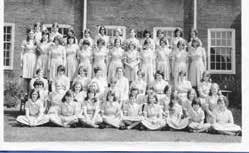
The winter school uniform was old fashioned and had remained the same for many years. For school days we wore a blue serge square-neck tunic over a white round-neck blouse. For non-school days we wore a blue serge dress with double-breasted buttons and a white pop-on collar, which would be changed periodically. The worst part of the uniform was the lisle stockings, which had little elasticity and became very baggy by the end of the day. For ‘best wear’ we had thick crepe stockings with a seam, held up with suspenders.
I loved music and learned the piano and, for a year, the cello. One time, a group of us gave a musical performance in Watford. My mum didn’t live far away and so was able to attend – happily, I could see her from the stage. I started playing with my knees gripping the cello and all I could see was my mum indicating to pull my dress down. Horrified, I realised that the audience could see the tops of my stockings and suspenders above my knees, either side of the cello, and I never played that instrument again!
We were sometimes allowed to wear our own clothes on a Saturday evening, and occasionally to play records, which was a highlight of the week. We also had a radio in the common room, and liked to tune into pirate radio, either Radio Caroline or Radio London. Unfortunately the only way to listen was to take it in turns to sit with a finger over the aerial hole!
The School had wonderful facilities: a vegetable garden, indoor swimming pool, gym, art studio, domestic science block, dining room, music rooms, Chapel and 18 classrooms along a corridor that was one eighth of a mile long. During this time the magnificent library was built, and the science block was in progress, although sadly not finished before I left.
The Fisheries behind the lower playing fields were out of bounds, but occasionally we would sneak over the fence for a paddle in the river.
I spent most of my weekends either playing sport or in detention for trivial misdemeanours such as talking after lights out, running down the corridor, having my bath on the wrong night, still having damp hair after swimming, not getting up with the rising bell or wearing the wrong shoes outside.

We linked up with the orchestra from the boys’ school to perform Noye’s Fludde in July 1967. Unsurprisingly there was much competition for places from both schools! It was performed at both Bushey and Ricky with nearly 200 performers. I managed to get a part playing a descant recorder.
As school leavers, we were invited to the United Grand Lodge for an interview with Lord Harris and a full tour. An exciting day out by train to London. Lord Harris presented us with a Bible and a Prayer Book, each inscribed with the School logo, with a new £1 note tucked inside. This £1 was subsequently taken by Sarge (Miss Dixon) as we left the room, which she informed us was for our Old Girls membership subscription! Despite the hardship of being away from home, it was a good grounding to become independent and confident from a young age, which has held me in good stead all my life.
Weybridge and Rickmansworth in the 1960s were very different to how the School is now. I spent one year at Weybridge and a few things stick in my mind. One was the fact that we took our school uniform home with us in the holidays because some of our parents couldn’t afford to buy coats or underwear.
Fire practice was quite unusual. We were sent to our dormitories to undress and when the bell went we were supposed to dress before evacuating.
Although I was not always happy at Rickmansworth, it has given me some lifelong friends.
I was at Weybridge between 1962 and 1965 (Mohawk House) and at Rickmansworth between 1965 and 1971.
Birthdays at school were happy times. Birthday tables consisted of up to 12 people and you could choose who would sit at your table with you.
On the day of your birthday, in preparation for the birthday tea, you would write your chosen friends on a decorated piece of paper which was handed to Matron. She would stand on the silence spot in the dining hall at the end of breakfast and read out the list. To have your best friends with you at teatime was a treat!
My mother would bring in a birthday cake for me the night before, as at that time my family only lived down the road, and this would be shared with the table of friends.
Also: making dens in the downstairs playground and roller skating round the ginkgo tree on the upper playground.
I only spent one term at Weybridge, in 1964. Apart from the morning classroom mantra of GOOD-MOR-NING-MISSGAM-BLE and learning all the words to ‘Macavity, The Mystery Cat’, my memories seem to be food related: Black polish (a blackcurrant trifle) on a Sunday, rice pudding with a brown skin topped with sliced oranges (delicious), cow pie (ham and egg – I don’t know why ‘cow’), two sweets each after lunch.
When I moved up to Rickmansworth, sport was an important part of my schooldays and Moira was a sporty house at the time. I loved hockey and had the opportunity to go to County Trials. Lacrosse was brilliant. I enjoyed being in the swimming team, although looking back I remember competing at other schools with outdoor salt water pools which were freezing. It certainly made us appreciate our pool.
My most admired teachers were Miss Claydon (PE) and Mrs Vronska (physics), who somehow got me through A Levels
I remember the new science block and library being built in my time. The Duchess of Kent came to officially open them in December 1970. Head Girl Vicky Berridge and I were invited to sit at the top table for afternoon tea. I was incredibly nervous. I remember being asked whether I wanted Indian or Chinese tea; I hadn’t a clue and asked for Chinese (I probably put milk in it) and it was awful. However, I do remember how very nice the Duchess of Kent was.
I enjoyed being the Chapel prefect and Deputy Head Girl and have very fond memories of all the Moira girls, no matter their age, and all my classmates.
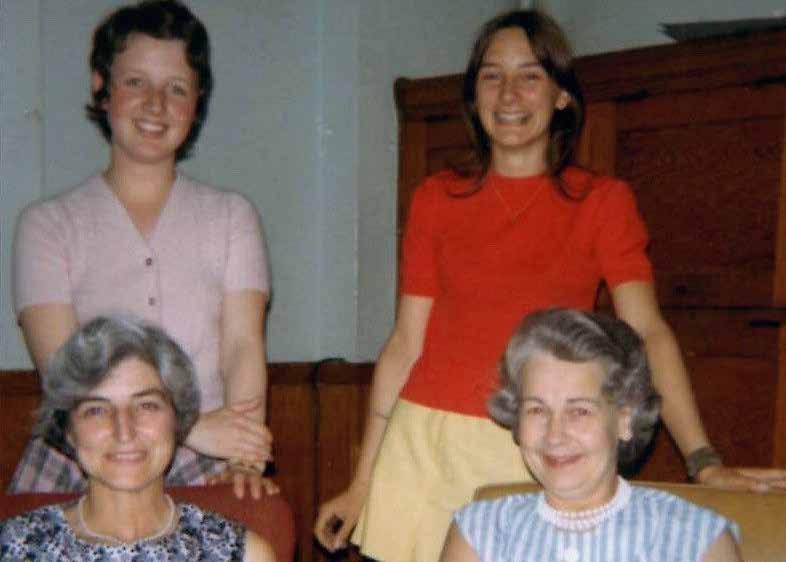 Sylvia (in pink) behind Miss Watkinson. Susan Corfe behind Mrs Hale, Matron
Sylvia (in pink) behind Miss Watkinson. Susan Corfe behind Mrs Hale, Matron
My father died in April 1965 and with the help of the Old Harlow Masonic Lodge, my mother was able to send me to RMS for Girls.
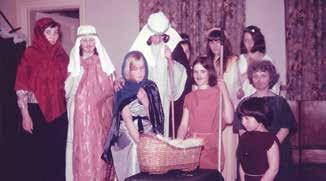
My mother, grandmother and I paid the School a visit during the summer holidays, taking the long walk from the station up and in through the school gates, to discover the very impressive buildings. I wonder how many times I did this walk while at Ricky.
On Tuesday 15 September 1965 at the age of 11, I started at RMIG. It was a very different life to what I had been used to. I’d been offered a last-minute place towards the end of the previous term and I was lucky that they managed to find me one.
Alison Cox in school uniform, 1965
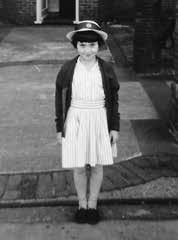
To begin with, several of us were very homesick, but soon adjusted to school life and having our meals at set times. There were four long tables for each house and the youngest sat in the middle of the table. As you moved up the school you moved further up either side of the table, until you reached the end in Sixth Form.
During my time I had two Housemistresses: Miss Newnham with her dog Max and Mrs Morphy-Morris. The Matrons were Miss Creighton, followed by Mrs Malone. Miss Newnham taught geography and would take us for walks outside the school grounds. In December 1966, some girls from Second and Third Forms performed Cinderella to the rest of the house, under her guidance.
We had a leaving party for Miss Newnham in the Upper Pavilion, where we all dressed up in western costumes, played many games (including a treasure hunt), had some party food and ended up doing the conga all the way back to Alex House.
I remember AL33 was my house number and every item of clothing belonging to me had an AL33 label sewn on it. All our dresses had to be four inches above the knee when kneeling on the floor.
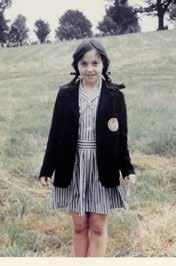

White bonbons, nut brittle, lemon sherbets and all those favourite sweets we went to get from the tuck shop. If we were ill, or went to see the dentist, we went to the San and were looked after by the formidable Sister Mytton. I remember the first time I went to the dentist, he gave me five fillings and no injection!
Detentions were held on a Saturday morning, missing out on our free time. Our termly pocket money was looked after by the Housemistress and given out on Saturday afternoons when we were taken down to Rickmansworth village to do our shopping. On our birthdays we were allowed to have a cake and a party with friends. My sister made me wonderful cakes: a chess board one year, a record player another.
Year II and III Alexandra House Christmas play: Cinderella, December 1966
On Halloween, the older girls would dress up as Ruspini, Pegleg and other spooky characters, wait until the younger girls were settled for the night, go into their dormitories and scare them with ghostly noises. We also had pillow fights, one dormitory against another. Midnight feasts, food and drink was smuggled into school and we would creep downstairs at midnight to sit on the floor of the common room to eat it.
All the girls in their first year were taken to the pond and had to swing on the willow tree branches over the water. You were lucky if you survived the ducking.
Alex House, 1970. Back row L-R: Christine Jones, Valerie Thompson, Jill Rolfe, Michele Edmonds, Sandra Canfield, Hilary Guile.
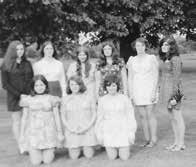
Front row: L-R: Alison Cox, Ann Wicking, Gillian Burrows
All girls were given three exeat visits a term. Our mothers would send in a permission card and were allowed to take us out on a set day between the times of 11am and 6pm. In the summer term of 1967, the half term exeat visit was increased to four days and the majority of the girls were allowed to go home, but had to be collected from school by an adult. My mother came to see me on every visit, although one time she nearly forgot, which would have been awful. My mother was an excellent letter writer and started out writing twice a week, eventually writing more often. All her letters were very welcome.
Every year the School held the inter-house drama competition. This was a day when we did not do school work, but spent the whole day sitting in the hall watching the other seven house plays and possibly performing in Alexandra’s play. It was all very exciting, especially waiting for the judge to announce the winner.
Sports Day was always very exciting and our family and friends came to see us, followed by a wonderful tea in the dining room or sitting on the grass. Prize Day was also a good day with prizes given out by a different Masonic Lodge each year and afterwards we would perform School Drill.
In 1969, when I was in Upper Sixth, I was awarded the Ashlar badge. All girls wore this badge with pride.
On Sunday 22 March 1970, we travelled by coach to Watford Town Hall to see a performance of Handel’s Messiah, various school orchestras and a combined choir from the Masonic Girls and Boys schools. My mother purchased two tickets at 12s 6d each. We were able to sit together for the performance, but I had to return to school immediately after by coach.
In December 1970, HRH the Duchess of Kent came to visit Ricky and officially open the new buildings – the library, science block and planetarium. It was a great day for everyone and even our mothers were allowed to attend.
On the last day of term, with everything packed up the day before, our trunks were sent by railway to arrive at home the same day as us girls. We woke up early to have breakfast in the dining room and then split up into groups to be taken by adults to a London mainline or underground station. The further away you lived, the earlier you left school.
In my last term in 1971, I remember visiting the Freemasons’ Hall in Great Queen Street to be shown around the museum. All leavers were presented with a Bible and Prayer Book signed by the Chairman of the House Committee.
I spent many happy years at Ricky and made some lifelong friends.
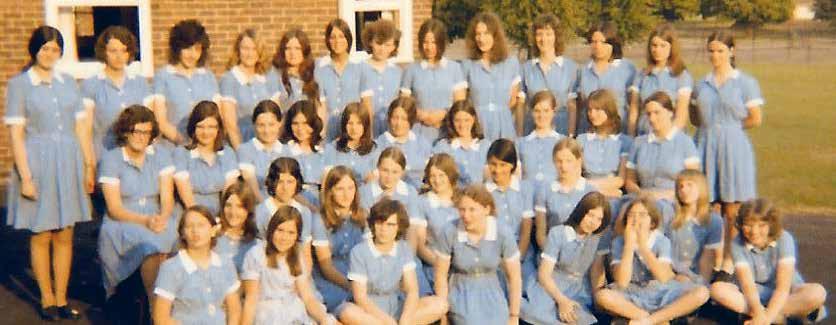
I arrived at Rickmansworth in September 1966. I was shown to a dorm and asked to put on a uniform. All new girls were clad in the same blue square-neck tunic with neckline white blouse. This felt very unfamiliar and our Clarks sandals were pretty stiff. I was shown to the main building and into Mrs Campbell’s office. She was very welcoming and tried to reassure everyone whom she met on their first day.
My escort (Angela Mabin, now Taylor), a girl in my year in Sussex House, was left to deal with me. Her confident air, cultivated over years of boarding, was very different to her tearful new friend, as she referred to me to her parents.
I found the first term quite difficult. After that, it was a case of taking on board the different routines as the seasons and weather changed. It was all uniform for most of us; we had to win an Ashlar badge if we hoped to wear home clothes on Saturdays. The same applied to leaving school in small groups, unsupervised. Locals in Rickmansworth often seemed keen to report any misdeeds!
The School started to take in fee-paying girls at this time. Although it could be said that those girls who paid fees and still had both parents were not at school under the same circumstances as those with one parent, or an ill parent, we never felt any differences between us. Interestingly, there was envy from both sides: the boarders envied those girls who went home each afternoon, while day girls thought that boarders had all the fun!
The rules seemed very strict to me. Thirteen years is not an ideal age for a change of this nature, but I came to regard it as beneficial in later years. I went on to get a degree in a French university. For this I have RMS to thank, in particular Commander Tottenham and the French department. He had been brought up in Switzerland, was of Canadian nationality and had served in the Royal Navy, which gave him a broad outlook.
RMS in those days may be regarded as overly-traditional, but my years there, taught me so much. I find that I can mix easily and appreciate people for what they are. We paid little heed to the social or material positions of girls around us and there was no room for being snobbish. We all learned to be compassionate and to try our best to comfort anyone who was unhappy.
The core values back then seem to be the same as they are now: girls growing into young women with a social conscience and consideration for others. Striving to improve, hoping to be to better able to make a real contribution in the world.
I joined Zetland in January 1969. I arrived at mid-morning break and a lot of girls came rushing up to see me. They thought that because I’d flown in from Uganda, I might be a different colour and when they saw me they were disappointed to note that I was ‘brown not black’.
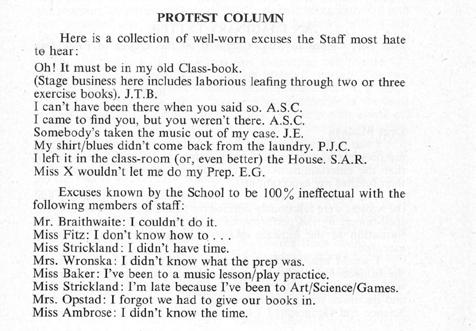
One winter’s day, I walked down to the pond to discover it was frozen solid. The only ice I had ever seen before was a small cube in a glass, so it was all new to me. I broke off a huge lump of ice and staggered back up the hill to show my prize to my friends, only to find that no one was impressed!
My Ricky days were generally happy and the Zetland girls are classed as my sisters. We still meet up most years and reminisce about our shared schooldays.
I started at Weybridge in 1965 when I was ten. After a year there, I moved up to the ‘big school’ in Rickmansworth. We had the chance to name a friend we would like to go into our new house with, and I was lucky to have mine join me in Zetland. We soon settled in and managed to find our way around. Learning that the teaching corridor was an eighth of a mile long was an indication of how far we walked each day. I certainly remember feeling tired for the first few days.

Life seemed to be run by bells. Morning wake up bell at 7am; first bell 7.15am to make sure we were up and washing and dressing; second bell 7.30am as a warning; and third bell 7.40am to assemble for morning call. We lined up in our decades and the prefect would count us off before we marched over for breakfast. Bell for silence at the end of meals. Bell at change of class, bell at recess, bell at lunch. I still dream of bells occasionally!
I was not the most obedient child during my time at RMS. I was never at risk of expulsion, but I did push the boundaries quite often. Along with a friend, we would be ‘out of bounds’ regularly.
On one such occasion we were on the uppers sitting right next to the boundary fence chatting to a couple of boys from the village. We had just finished our illicit cigarettes when all of a sudden, we heard . . . “What goes on?” Our hearts sunk as a small dog rushed up to us, wagging his tail. The Atholl Housemistress was out walking her dog and found us. Miss Newnham (Goat) always used this phrase when asking what one was doing. Needless to say, we were marched back to school and to Miss Hopkins’ (Hoppy) Sixth Form French class. The two Housemistresses conferred and then we were told to sit at the back of the class and write exactly what we had been doing on the uppers. No chance to decide what we would say, we both just hoped neither of us would mention the cigarettes!
Along with several friends, I did find my way to the tunnel under the cloisters, via the door at the back of the Chapel (out of bounds, again!). We had to climb over some waist-high pipes and cables to enter. It was very dusty and gloomy, but it was warm so must have been where the heating pipes for the houses were accessed for maintenance. As a grandmother now, I can see how risky this activity was for young children but oh, we did have fun!
There are so many memories of my days at RMS, some good and some sad. My experience during the seven years I was boarding shaped me as a person. I learned to be resourceful, to be strong in my convictions, to be a loyal friend, to be respectful of my elders and to have good manners. As a well-rounded adult in the real world I have amazed my family with my eclectic general knowledge, from classical music to scientific, to sewing, to painting, to cooking, to the human body, to oratorios; the list goes on. We had more than a basic education and I find it amazing how I can dredge up an off-the-wall fact learned long ago.
School life was very different back then. I wonder: do the new girls still ‘cross off’ the dining room pictures high above the tables at the end of the first term? Does each boarding house still make a Christmas post box for girls to post their Christmas cards to their friends? Are the new girls ‘christened’ in the pond? Do the leavers run riot with pranks at the end of the summer term?

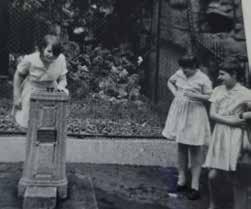
So many lovely memories . . .
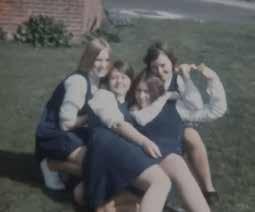
These diary entries from 1966 might give a little insight into my life at RMIG in the 1960s. I think they may have been written during a flu epidemic in the School.

January 1966
Monday 24
I went to the San (Sanatorium) in the morning because I had a very high temperature. I had to stay in bed all day.
Tuesday 25
I was moved to a different ward but still had to stay in bed all day. Worse luck two other girls came in our ward.

Wednesday 26
I had a lovely long letter from Mummy today and we had good fun in the ward.
Thursday 27
I missed my music lesson today, and I got another letter from my Mummy, lucky lucky me.
Friday 28
I still had to stay in bed, because I still had a temperature worse luck. It rained nearly all the day.
Saturday 29
I had to miss television, because I still had a high temperature. Worse luck.
Sunday 30 There was no Chapel at all.
visit
We did needlework at RMS and I remember making some purple baby doll pyjamas with white spots! By the time I got to Sixth Form, I was making long, floaty skirts and dresses, hippy style, to wear with boots or sandals.
Hilary and Val wearing their home-made dresses, c.1969
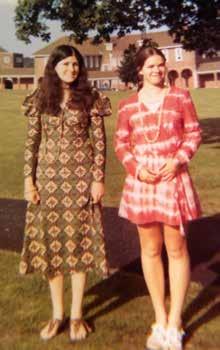
First year at Alex House. Hilary seated 2nd row, far left. Val sitting in front of her.
